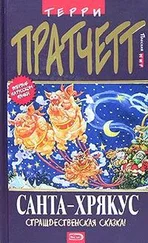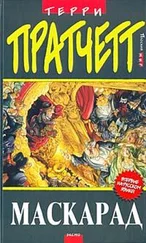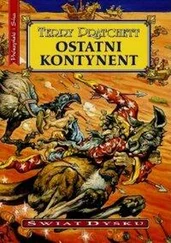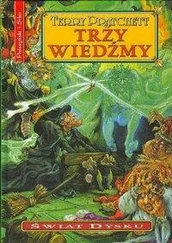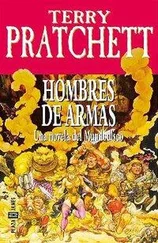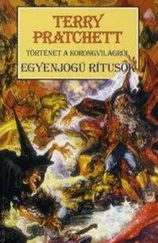Terry Pratchett - Science of Discworld
Здесь есть возможность читать онлайн «Terry Pratchett - Science of Discworld» весь текст электронной книги совершенно бесплатно (целиком полную версию без сокращений). В некоторых случаях можно слушать аудио, скачать через торрент в формате fb2 и присутствует краткое содержание. Жанр: Фантастика и фэнтези, на английском языке. Описание произведения, (предисловие) а так же отзывы посетителей доступны на портале библиотеки ЛибКат.
- Название:Science of Discworld
- Автор:
- Жанр:
- Год:неизвестен
- ISBN:нет данных
- Рейтинг книги:4 / 5. Голосов: 1
-
Избранное:Добавить в избранное
- Отзывы:
-
Ваша оценка:
- 80
- 1
- 2
- 3
- 4
- 5
Science of Discworld: краткое содержание, описание и аннотация
Предлагаем к чтению аннотацию, описание, краткое содержание или предисловие (зависит от того, что написал сам автор книги «Science of Discworld»). Если вы не нашли необходимую информацию о книге — напишите в комментариях, мы постараемся отыскать её.
Science of Discworld — читать онлайн бесплатно полную книгу (весь текст) целиком
Ниже представлен текст книги, разбитый по страницам. Система сохранения места последней прочитанной страницы, позволяет с удобством читать онлайн бесплатно книгу «Science of Discworld», без необходимости каждый раз заново искать на чём Вы остановились. Поставьте закладку, и сможете в любой момент перейти на страницу, на которой закончили чтение.
Интервал:
Закладка:
After all, the Archchancellor pointed out, once people had something to stand on they'd need something to breathe, wouldn't they? Atmospheres seemed to turn up on cue. But they were dreadful things, full of stuff not even a troll would suck.
In the absence of gods, he declared, and a series of simple tests had found no trace of deitygen, it was up to men to get it right.
The High Energy Magic building was getting crowded now. Even the student wizards were taking an interest, and usually they weren't even seen during daylight. The Project promised to offer even greater attractions than staying up all night playing with HEX and eating herring and banana pizza.
More desks had been moved in. The Project was in an expanding circle of instruments and devices, because it appeared that every wizard apart from, possibly, the Professor of Eldritch Lacemaking, had decided he was working on something that would benefit immensely from access to the Project. There was certainly room. While the Project was indeed about a foot wide, the space inside seemed to be getting bigger by the second. A universe offers lots of space, after all.
And while ignorant laymen objected to magical experiments that were by no means dangerous, there being less than one chance in five of making a serious breach in the fabric of reality, there was no one in there to object to anything.
There were, of course, accidents ...
'Will you two stop shouting!' yelled the Senior Wrangler. Two student wizards were arguing vehemently, or at least repeatedly stating their point of view in a loud voice, which suffices for argument most of the time.
'I'd spent ages putting together a small icy ball and he sent that wretched great rock smack into it, sir.'
'I wasn't trying to!' said the other student. The Senior Wrangler stared at him, trying to remember his name. As a general rule, he avoided getting to know the students, since he felt they were a tedious interruption to the proper running of college life.
'What were you trying to do, then ... boy?' he said.
'Er ... I was trying to hit the big ball of gas, sir. But it just sort of swung around it, sir.'
The Senior Wrangler looked around. The Dean was not present. Then he looked into the Project.
'Oh, I see. That one. Quite pretty. All those stripes. Who built that?'
A student raised his hand.
'Ah, yes ... you,' said the Senior Wrangler. 'Good stripes. Well done. What's it made of?'
'I just dragged a lot of ice together, sir. But it got hot.'
'Really? Ice gets hot in a ball?'
In a big ball, sir.'
'Have you told Mister Stibbons? He likes to know that sort of thing.'
'Yes, sir.'
The Senior Wrangler turned to the other student.
'And why were you throwing rocks at his big ball of gas?'
'Er ... because you score ten for hitting it, sir.'
The Senior Wrangler looked owlishly at the students. It all became clear. He'd wandered into the HEM one night when he couldn't sleep and a mob of students had been hunched over the keyboards of HEX and shouting things like 'I've got the battering ram! Hah, eat hot naphtha, evil dog!' Doing that sort of thing in a whole new universe seemed ... well, impolite.
On the other hand, the Senior Wrangler shared with some of his colleagues an unformed thought that pushing back the boundaries of knowledge was not quite ... well, polite. Boundaries were there for a reason.
'Are you meaning to tell me,' he said, 'that faced with the multitudinous possibilies of the infinity that is the Project you are using it to play some sort of game?'
'Er ... yes, sir'
'Oh.' The Senior Wrangler looked closely at the big ball of gas. A number of small rocks were already spinning slowly around it. 'Well, then ... can I have a go?'
THE SHAPE OF THINGS
WHEN WIZARDS FIND A NEW THING, THEY PLAY WITH IT. So do scientists. They play with ideas so wild that often they seem to defy common sense, and then they insist that those ideas are right, and common sense isn't. They often make out a surprisingly good case. Einstein once said something nasty about common sense being akin to nonsense, but he went too far. Science and common sense are related, but indirectly. Science is something like a third cousin of common sense twice removed. Common sense tells us what the universe seems like to creatures of our particular size, habits, and disposition. For instance, common sense tells us that the Earth is flat. It looks flat, leaving out the hills, valleys, and other bumps and dents ... If it wasn't flat, things ought to roll around or fall off. Despite this, the Earth isn't flat. On Discworld, in contrast, the relation between common sense and reality is usually very direct indeed. Common sense tells the wizards of Unseen University that Discworld is flat, and it is. To prove it, they can go to the Edge, as Rincewind and Twoflower do in The Colour of Magic, and watch stuff disappearing over it in Rimfall: 'The roaring was louder now. A squid bigger than anything Ricewind had seen before broke the surface a few hundred yards away and thrashed madly with its tentacles before sinking away ... They were running out of world.' Then they can be trapped in the Grcumfence, a ten thousand mile long net set just below the Edge, one tiny bit of which is patrolled by Tethis the sea troll. And they can peer over the edge: '... the scene beneath him flipped into a whole, new, terrifying perspective. Because down there was the head of an elephant as big as a reasonably-sized continent... Below the elephant there was nothing but the distant, painful disc of the sun. And, sweeping slowly past it, was something that for all its city-sized scales, its crater-pocks, its lunar cragginess, was indubitably a flipper.'
It is widely imagined that ancient people thought the Earth was flat, for all those obvious commonsense reasons. Actually, most ancient civilizations that left records seem to have worked out that the Earth has to be round. Ships came back from invisible lands over the horizon and, in the sky, a round sun and a round moon were a definite clue ...
That's where science and common sense overlap. Science is common sense applied to evidence. Using common sense in that manner, you often come to conclusions that are very different from the obvious common sense assumptions that because the universe appears to behave in some manner, then it really does. Of course it also helps to realize that if you live on a very big sphere, it's going to look pretty flat for quite a long way off. And if gravity always points towards the middle of the sphere, then things don't actually roll around or fall off. But those are refinements.
Around 250 BC a Greek called Eratosthenes tested the theory that the Earth is a sphere, and he even worked out just how big that sphere is. He knew that in the city of Syene, present-day Aswan in Egypt, the midday sun could be seen reflected in the bottom of a well. (This would not work in Ankh-Morpork, where the well-water is often more solid than the well that surrounds it.) Eratosthenes threw in a few other simple facts and got back a lot more than he'd bargained for.
It's a matter of geometry. The well was dug straight down. So the Sun at Syene had to be straight up, dead overhead. But in Eratosthenes' home city of Alexandria, in the Nile delta, that didn't happen. At midday, when the sun was at its highest, Eratosthenes cast a definite shadow. In fact, he estimated that at noon the angle between the Sun and the vertical was just over 7°, near enough 1/50 of 360°. Then came the leap of deduction. The Sun is in the same place wherever you observe it from. On other grounds, it was known that the Sun had to be a long way away from the Earth, and that meant that the Sun's rays that hit the ground in Alexandria were very nearly parallel to those that went down the well in Syene. Eratosthenes reasoned that a round Earth would explain the difference. He deduced that the distance from Syene to Alexandria must be 1/50 of the circumference of the Earth. But how far was that?
Читать дальшеИнтервал:
Закладка:
Похожие книги на «Science of Discworld»
Представляем Вашему вниманию похожие книги на «Science of Discworld» списком для выбора. Мы отобрали схожую по названию и смыслу литературу в надежде предоставить читателям больше вариантов отыскать новые, интересные, ещё непрочитанные произведения.
Обсуждение, отзывы о книге «Science of Discworld» и просто собственные мнения читателей. Оставьте ваши комментарии, напишите, что Вы думаете о произведении, его смысле или главных героях. Укажите что конкретно понравилось, а что нет, и почему Вы так считаете.

